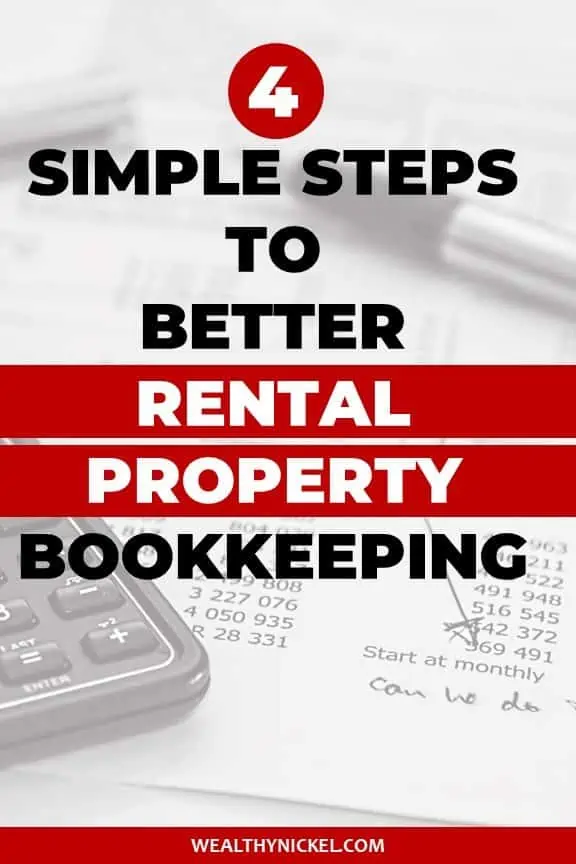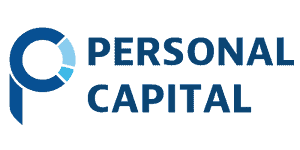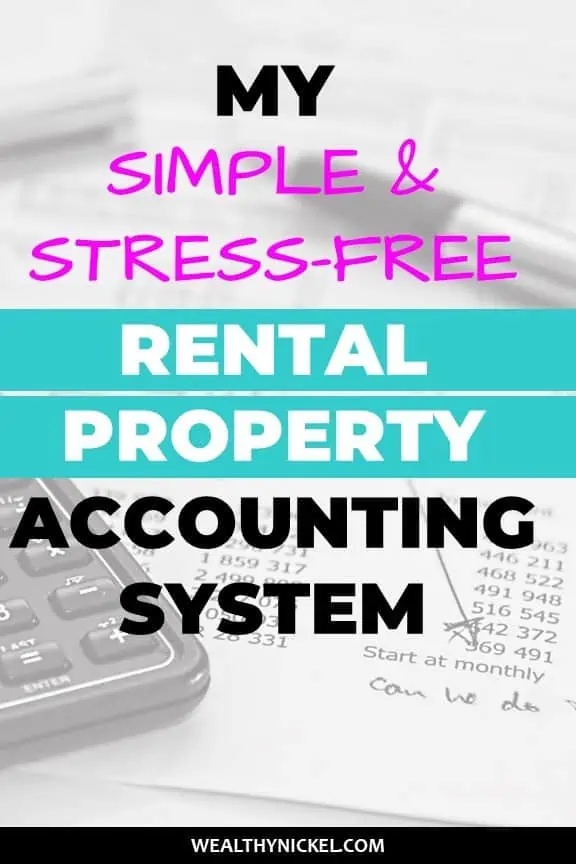I have been a real estate investor for several years now, and I can’t think of a time when anyone has gotten excited about the topic of rental property accounting.
I’ve heard many exciting tales of finding the perfect deal, or negotiating through an impossible situation, or the ever popular tenant horror stories. But if you start talking about rental property bookkeeping, people’s eyes glaze over. Or they look down uncomfortably, knowing they need to do a better job in their accounting but don’t know where to start.
The truth is, a solid bookkeeping system is the backbone of your rental property business. And yes, whether you have 1 property or 100, you should be treating it like a business!
Read on to find out:
- how I spend less than 5 minutes per month per property on bookkeeping
- how I’m able to run financial reports and analysis with confidence
- and how I have immaculate records ready to hand over to our accountant at tax time!
RENTAL PROPERTY ACCOUNTING BASICS
There are a few things that every real estate investor (or any business owner) needs to get right to set their rental property bookkeeping system up for success.
1. Separate Your Business and Personal Finances
If you haven’t heard this a million times before, let me say it again. Do not mix your business and personal finances!
In addition to being an IRS audit nightmare, it just makes it extremely difficult to go back and reconcile what was spent on personal vs. business items. For example, was that trip to Home Depot for plants for your personal home, or a new sink faucet for your rental property? Or a mixture of both?
I personally have a separate credit card and checking account that I only use for our real estate expenses. So if I go to Home Depot for both personal items and rental property items, I check out twice. Once with my personal credit card, and once with my business card.
2. Consider Having Separate Accounts for Each Property
While this is not a requirement, if you have 1-4 properties or so, you can make things really easy on yourself by setting up a separate bank account for each property you own.
Then set up all of your income and expenses for a given rental house to run through that specific account. Set up your rent deposits to go to that account, put your mortgage payment on autopay from that account, and run any expenses such as property management, repairs, etc. through that same account.
This is the absolute easiest set up you could have, as you will have a running total of all your income and expenses at the end of the year just by looking at your bank statement!
3. Automate Everything
In the digital age we live in, there is no excuse for not taking advantage of all the efficiencies to be gained by automating as much as you possibly can. Rental property bookkeeping doesn’t have to be a labor intensive task if you set things up right from the beginning.
Here are a few easy ways to automate your accounting tasks:
- Online rent collection – I pretty much require all of my tenants to pay online through an automatic ACH bank draft. It then goes directly into my bank account, and I don’t have to chase anyone down. There are a lot of services out there, but I’ve been using Cozy.co for several years now and highly recommend their service.
- Set up mortgage autopay – I would be lost if my bills didn’t pay themselves every month. It is a no brainer to set up autopay with your lender to pay the mortgage every month.
- Link your accounts online – If you use something like Mint or Personal Capital to manage your personal budget and finances, then you can also pull in your business accounts
4. Digitize Everything
Forget the old days of sitting down at the kitchen table with a box of receipts and manually entering them into Excel (or – the horror! – a paper notebook).
There are a million apps and tools out there to help you digitize receipts and keep your documents in order. Believe me, I’ve tried a lot of them. But I could never seem to consistently stick to the system.
The best system is whichever one you will actually use. And what worked for me was incorporating the tools I was already using on a daily basis – email and Google Drive.
Here is my method for making sure I’m never collecting paper receipts and invoices:
- Take a picture of all receipts – If I go to the store and have a paper receipt, I will snap a picture. If you have multiple properties quickly write which property it’s for on the receipt before you take a picture.
- Email the receipt to myself – You can either set up a dedicated email account for each property, or a general “rental property bookkeeping” email account. In the subject line, put the name of the property, where the receipt is from, and the date.
- (Optional) Transfer to Google Drive – If you’re more of an online cloud storage kind of person, you can either save the picture directly to Google Drive or a similar service, or periodically check your rental property email account and transfer the files there.
The same thing works for mortgage statements, invoices from contractors, and any other piece of paper related to your rental properties. Or if you get invoices or mortgage statements in your email, either get them sent directly to your rental property email address, or forward them there.
I promise you, this advice is worth its weight in gold. From experience, keeping track of receipts, invoices, and tax documents caused me all kinds of stress. But with this simple system, I put everything into the same place that is easily accessible, searchable, and backed up in the cloud. This will get you miles closer to the goal of stress-free rental property accounting!
HOW TO CLASSIFY YOUR INCOME AND EXPENSES
Now that you have a system set up separate your rental property transactions from your personal and keep track of all of the associated paperwork, what’s the best method to classify your income and expenses for your CPA or your own financial analysis?
What Categories Should I Use for Rental Income and Expenses?
Again, I like to keep it simple and go straight to the source – IRS Schedule E – Supplemental Income and Loss from Real Estate.
That form gives you all the categories the IRS wants you to use for tax purposes to report your income and expenses from your rental properties. Here they are:
- Rents received – All rent collected from your rental property. I do break mine down a little further and track late fees separately so I know where those are coming from. Also if you collect any other income not specifically related to rent (such as laundry or parking) I’d break those out just for your own records.
- Advertising – Anything you spend on advertising your house for rent such as signs or online placement fees.
- Auto and travel – Track your mileage for any trips that are related to your business! A lot of people forget this one.
- Cleaning and maintenance – Self-explanatory. Anything related to cleaning or maintaining your property in its current condition.
- Commissions – If you use a real estate agent or management company to find a tenant, they probably charge a commission of 0.5 – 1 month’s rent for this service.
- Insurance – If you have a mortgage, this is probably escrowed. At the end of the year you can look at your mortgage statement to see how much was allocated to insurance.
- Legal and other professional fees – Any attorney or other professional fees (for example, for an eviction). Don’t forget that any fees your CPA charges you to prepare your rental property taxes can be expensed here!
- Management fees – If you have a property management company, any monthly or ad hoc fees they charge for management of your rental.
- Mortgage interest – Also part of your mortgage, you can find this on the mortgage statement.
- Other interest – If you have another loan, such as a short term construction loan, you can deduct that interest as well.
- Repairs – While maintenance was covered above, anything that needs replaced or repaired would go here. Make sure to talk to your CPA about the difference between a repair and a capital expense, as they are treated differently for tax purposes even if it makes no difference to your cash flow.
- Supplies – Anything you buy for the rental property such as HVAC filters or cleaning products.
- Taxes – Property taxes, also found on your mortgage statement.
- Utilities – Electricity, gas, water, sewer, trash service, etc. that you pay for as the landlord
- Depreciation – This is one of those “phantom” expenses that make real estate income very tax-advantaged. This is an article unto itself, but suffice it to say, talk to a professional accountant or CPA to make sure you get this right.
- Other – Anything not covered above. For example, we usually send a small gift card to our tenants at Christmas which can be expensed.
Rental Property Bookkeeping 101 – Tracking and Classifying Transactions
Once you’ve collected all the transactions related to your rental property (hopefully automatically through the methods we talked about above), it’s time to do the basic bookkeeping task of classifying and categorizing them so you can run reports to see how your property is performing and be organized for tax time.
There are a lot of tools out there, from the humble Excel spreadsheet all the way up to a full-fledged accounting product like Quickbooks.
Once we had several properties under our belts (and multiple other streams of income), we switched over to Quickbooks. It has been great to keep everything in one place and is extremely powerful in allowing me to separate our different income streams, categorize expenses, and run hundreds of different reports.
But if you’re just getting started, I would not recommend Quickbooks. You honestly don’t need it, and the learning curve is a little steep.
Here are the two methods I recommend for categorizing transactions. Choose whichever one you are most comfortable with.
- Excel Spreadsheet – If you’ve followed the advice above and kept all your transactions organized and in the same bank account (or two), it’s pretty simple to download the transactions from your bank and copy and paste them into an Excel sheet. You can then add a column for the appropriate income or expense category and classify each transaction. If you’re experience in Excel, a quick pivot table will give you a profit and loss statement, or you can build it fairly easily by hand.
- Personal Capital or Mint – These two online tools allow you to automatically import your bank transactions and you can assign categories within the tool and run basic profit and loss, cash flow, and even (in the case of Personal Capital) balance sheet statements.
I really like Personal Capital and recommend it to whoever will listen. Mint is a powerful budgeting tool, but Personal Capital takes it up a notch and keeps track of your net worth (balance sheet) and other investments as well.
If I had just one or two (maybe up to four) rental properties, I would probably use Personal Capital exclusively to do the basic bookkeeping and accounting. You can see your profit and loss, cash flow, and net worth all in one convenient app.
Personal Capital helps me keep track of my net worth without having to worry about logging into 37 different accounts (ok maybe a slight exaggeration, but not much) to add up all my balances.
If you’re looking for a single app to help you keep track of your income, expenses, net worth, and investment accounts, I highly recommend giving it a try. It even helps you optimize your portfolio’s asset allocation and shows you where you can save on fees.
SUMMARY OF RENTAL PROPERTY ACCOUNTING 101
Rental property bookkeeping can seem overwhelming when you’re just getting started. But it doesn’t have to be hard!
While all your real estate investor friends are scrambling around at tax time to desperately try to reconstruct their books (or paying their CPA an exorbitant fee to sort through their mess of paperwork), you will be sipping margaritas on the beach, stress free.
With a few simple systems in place, you can be sure you are accounting for all your income and expenses and can be confident in your financial analysis.
You’ll be light years ahead of the average investor who couldn’t even tell you if they’re turning a profit with their rental property! You certainly don’t have to become a full-time bookkeeper to keep things running smoothly.
5 Steps to Stress-Free Rental Property Bookkeeping
- Keep your business and personal finances separate
- Automate your rent collection, payments, and transactions
- Digitize everything using my simple method
- Classify transactions the easy way with online tools
- Hand over your records to your CPA with confidence!
Andrew Herrig is a finance expert and money nerd and the founder of Wealthy Nickel, where he writes about personal finance, side hustles, and entrepreneurship. As an avid real estate investor and owner of multiple businesses, he has a passion for helping others build wealth and shares his own family’s journey on his blog.
Andrew holds a Masters of Science in Economics from the University of Texas at Dallas and a Bachelors of Science in Electrical Engineering from Texas A&M University. He has worked as a financial analyst and accountant in many aspects of the financial world.
Andrew’s expert financial advice has been featured on CNBC, Entrepreneur, Fox News, GOBankingRates, MSN, and more.



